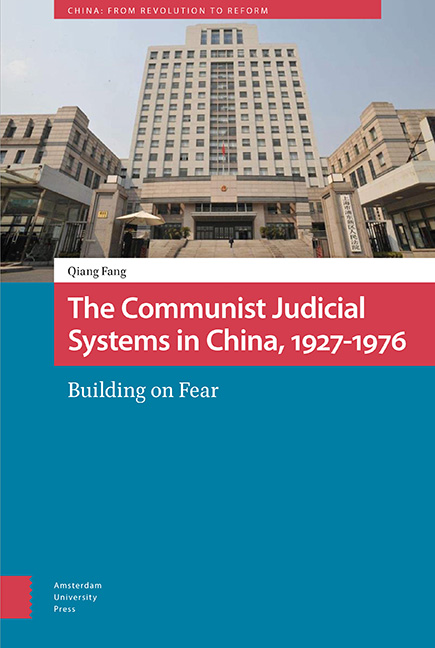Book contents
- Frontmatter
- Contents
- List of Tables
- Dedication
- Acknowledgement
- Acronyms
- Introduction: Building on Fear
- 1 Born in Blood: Origin of the Communist Judicial System in China, 1927–1935
- 2 Cornerstone or Aberration?: The Communist Judicial System during Wars with Japan and the GMD, 1936–1949
- 3 From “Excessive Lenience” to Harshness: The Communist Judicial System in the Early PRC, 1949-1952
- 4 A Deliberate Purge: Legal Reform in the Early PRC, 1952-1953
- 5 A Golden Age?: The Communist Judicial System in China, 1953-May 1957
- 6 The Great Leap of Law: The Communist Judicial System in China, 1957-1965
- 7 Not the Worst Period of Law: The Communist Judicial System in the Cultural Revolution, 1966-1976
- Conclusion: From Party’s Fear to People’s Fear
- Bibliography
- Index
2 - Cornerstone or Aberration?: The Communist Judicial System during Wars with Japan and the GMD, 1936–1949
Published online by Cambridge University Press: 18 June 2021
- Frontmatter
- Contents
- List of Tables
- Dedication
- Acknowledgement
- Acronyms
- Introduction: Building on Fear
- 1 Born in Blood: Origin of the Communist Judicial System in China, 1927–1935
- 2 Cornerstone or Aberration?: The Communist Judicial System during Wars with Japan and the GMD, 1936–1949
- 3 From “Excessive Lenience” to Harshness: The Communist Judicial System in the Early PRC, 1949-1952
- 4 A Deliberate Purge: Legal Reform in the Early PRC, 1952-1953
- 5 A Golden Age?: The Communist Judicial System in China, 1953-May 1957
- 6 The Great Leap of Law: The Communist Judicial System in China, 1957-1965
- 7 Not the Worst Period of Law: The Communist Judicial System in the Cultural Revolution, 1966-1976
- Conclusion: From Party’s Fear to People’s Fear
- Bibliography
- Index
Summary
Abstract
Many scholars in China have applauded the legal system and practices such as the Ma Xiwu method of dealing with rural marriage cases in the Shaanxi Border Region as a main pillar of the PRC legal construction. This chapter challenges this view with an argument that those scholars have ignored the enormous number of arbitrary transgressions of the law, such as torture and imprisonment. Nor do those scholars pay much attention to the CCP's “voluntary” acceptance of Republican laws during the anti-Japanese war. In stark contrast to CCP's previous and ensuing anti-GMD propaganda and policies, the period of the Border Area could be better called an aberration from the Communist judicial tradition rather than a cornerstone.
Keywords: Shanganning Border Area High Court, Li Mu’an, Lei Jingtian, human sentiment, rectification campaign
The year of 1936 was a turning point for the Chinese Communist Party (CCP). On the one hand, the main force of the Red Army had completed its heroic long march in early 1936 and joined a local Communist force in the region of northern Shaanxi; on the other hand, Zhang Xueliang, the “Young Marshall” who was prodded by Chiang Kai-shek to fight the Red Army, decided to kidnap Chiang on December 12 and to force him to turn his guns against the Japanese rather than the Red Army. These dramatic developments offered CCP leader Mao Zedong a prime opportunity to consolidate the fragile Communist control in the Shanganning Border Area (hereinafter the Border Area). Together they transformed the Party from being a “marginal force on the periphery of Chinese society” into being the “major contender for national power” after the war. According to Zhang Guotao, one of CCP's founders and a contender with Mao for power inside the Party, a negotiation with Chiang Kai-shek was critical to the survival of the CCP. Mao therefore “concealed” his animosity toward Chiang and “pretended” to make resistance to the Japanese a primary goal of the CCP. The CCP publicly announced that it was willing to make significant compromises such as declaring the Border Area a regional government under the Nationalist Party (the Guomindang, or GMD) and recognizing Chiang Kai-shek as China's sole leader.
Soon after Japan launched a sweeping attack on China in July 1937, the CCP proclaimed that resisting Japan should be the top priority of the nation and the Red Army would fight under the GMD.
- Type
- Chapter
- Information
- The Communist Judicial System in China, 1927–1976Building on Fear, pp. 75 - 108Publisher: Amsterdam University PressPrint publication year: 2021



